The first discussion of the Pressing Club of “168 Hours” newspaper that was conducted by its deputy to chief editor, political reporter, Armen Baghdasaryan, was dedicated to this question and the issue of democracy. During the discussion, he reminded the participants about a phrase said by Winston Churchill, who said that democracy is the most bearable form of management among the worst ones. It seems that the Armenian people have understood it since they have written in the Constitution that Armenia is a democratic state. Nevertheless, connected with the 15th anniversary of independence the Pressing club decided to dedicate its first discussion to this issue that contains many components.
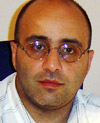 The head of AEPLAC company, Tigran Jrbashyan does not agree with the ideas spoken recently saying that it is impossible to develop without democracy. He thinks that the development of the country should not be connected with democracy. On the one hand, Mr. Jrbashyan brought the example of the Asian countries (Singapore, South Korea, Taiwan) connected with the locomotive of the developed countries. On the other hand, it is worth mentioning the example of two African countries, Togo and Benin as well. According to Mr. Jrbashyan, these two countries are very like each other with their resources, geographic location, etc. The only difference is the fact that Togo has democracy, but Benin does not. However, people live better in Togo. Nevertheless, Mr. Jrbashyan thinks that there is alternative for democracy: “The existence of democracy depends on the status of the given nation. I mean that it depends on the existing non-formal institutions, religion, habits, etc. All what is being done in the Eastern civilization (China, Taiwan, South Korea) is impossible to do in European countries, where Armenia is a part of that civilization. Democracy is attribute that should be connected with the conditions in the given state as well. We should not make the issue abstract, i.e. should not discuss whether it is good or not, but should localize it for Armenia”.
The head of AEPLAC company, Tigran Jrbashyan does not agree with the ideas spoken recently saying that it is impossible to develop without democracy. He thinks that the development of the country should not be connected with democracy. On the one hand, Mr. Jrbashyan brought the example of the Asian countries (Singapore, South Korea, Taiwan) connected with the locomotive of the developed countries. On the other hand, it is worth mentioning the example of two African countries, Togo and Benin as well. According to Mr. Jrbashyan, these two countries are very like each other with their resources, geographic location, etc. The only difference is the fact that Togo has democracy, but Benin does not. However, people live better in Togo. Nevertheless, Mr. Jrbashyan thinks that there is alternative for democracy: “The existence of democracy depends on the status of the given nation. I mean that it depends on the existing non-formal institutions, religion, habits, etc. All what is being done in the Eastern civilization (China, Taiwan, South Korea) is impossible to do in European countries, where Armenia is a part of that civilization. Democracy is attribute that should be connected with the conditions in the given state as well. We should not make the issue abstract, i.e. should not discuss whether it is good or not, but should localize it for Armenia”.
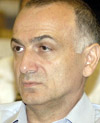 Member of ULP (United Labor Party), NA deputy Arthur Petrosyan thinks that the problem of the necessity of democracy is solved already: “If we are discussing the issue in the framework of the state interests, our state has already made a decision to go towards the Euro Union. I don’t think it is possible to be integrated in the EU without democracy. This is all what I can say about it”.
Member of ULP (United Labor Party), NA deputy Arthur Petrosyan thinks that the problem of the necessity of democracy is solved already: “If we are discussing the issue in the framework of the state interests, our state has already made a decision to go towards the Euro Union. I don’t think it is possible to be integrated in the EU without democracy. This is all what I can say about it”.
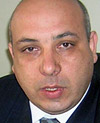 Deputy head of ANM party, Khachatour Kokobelyan doesn’t agree with comparing Armenia with Singapore and says, “Democracy is necessary not only for having a progressive economy, but as well as for living well”. The latter doesn’t think that democracy is a premise for developed economy, but the vice versa; he thinks that developed economy is a premise for democracy. Mr. Kobelyan thinks that as well as the will of the existing authorities is a premise for development. According to the deputy chief to the ANM head, both these premises together may provide democracy.
Deputy head of ANM party, Khachatour Kokobelyan doesn’t agree with comparing Armenia with Singapore and says, “Democracy is necessary not only for having a progressive economy, but as well as for living well”. The latter doesn’t think that democracy is a premise for developed economy, but the vice versa; he thinks that developed economy is a premise for democracy. Mr. Kobelyan thinks that as well as the will of the existing authorities is a premise for development. According to the deputy chief to the ANM head, both these premises together may provide democracy.
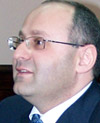 As for Ashot Osipyan, deputy to the RA Central Bank president, when speaking about democracy he spoke the idea of Roosevelt saying that democracy is the choice of majority, majority does not make faults. According to Mr. Osipyan, all the countries come to democracy, but they have to develop to that level: “The Soviet Union declared democracy too, but its democracy was centralized. In that environment, there was anarchy. We should be careful since there are many examples in African countries, where democracy turned to anarchy. There has been the vice versa too; democracy turned to a totalitarian system”.
As for Ashot Osipyan, deputy to the RA Central Bank president, when speaking about democracy he spoke the idea of Roosevelt saying that democracy is the choice of majority, majority does not make faults. According to Mr. Osipyan, all the countries come to democracy, but they have to develop to that level: “The Soviet Union declared democracy too, but its democracy was centralized. In that environment, there was anarchy. We should be careful since there are many examples in African countries, where democracy turned to anarchy. There has been the vice versa too; democracy turned to a totalitarian system”.
Lawyer, businessman Sargis Aghabekyan thinks that the purpose of a state is to create a mechanism on a certain territory, which would protect the rights of its citizens in the most optimal manner. According to Mr. Aghabekyan, one of those methods is developing democracy, which enhances citizens keep contact with the state. “The state has an opportunity to learn about the problems in the society. Thus, the state may apply different mechanisms and provide development”.
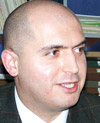 Member of the Armenian Republican party, NA deputy Armen Ashotyan thinks that it is more important to discuss whether democracy is accepted as a value or as a temporary goal that is connected with the modern understanding of the 21 century. “If it is considered as a value, we should have certain cultural, traditional and civil values in our society. In its meaning democracy is out of the mentioned values in our society. As for the shapes, we should meet the challenges that we are faced with the 21 century”.
Member of the Armenian Republican party, NA deputy Armen Ashotyan thinks that it is more important to discuss whether democracy is accepted as a value or as a temporary goal that is connected with the modern understanding of the 21 century. “If it is considered as a value, we should have certain cultural, traditional and civil values in our society. In its meaning democracy is out of the mentioned values in our society. As for the shapes, we should meet the challenges that we are faced with the 21 century”.
According to the latter, if democracy means improving the system of elections, it is a primitive explanation, and if it means protection of the rights of minority, we haven’t grown to that level yet and it can’t be realized now. A. Ashotyan thinks that democracy is a developing institution. The latter says that we should understand where the world democracy may lead and what kind of institutions may be developed. “We are entering a new phase of information technologies and I wander whether democracy may be competent in that society or not. People are becoming apolitical and even though they have much information, they are not interested in democratic solutions. People and the state are becoming two lines that are parallel and may cross rarely”.
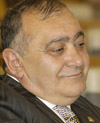 The RA prime minister, Andranik Margaryan did not agree with the abovementioned explanation and said that democracy is one of the most important values in our society. According to the prime minister, democracy is an environment of trust among citizens, which is transformed to a relationship with the state. “Due to that trust we are able to resist the foreign pressure and attacks, as well as internal separation. However, we have always tended to democracy and now are trying to develop it”, says A. Margaryan.
The RA prime minister, Andranik Margaryan did not agree with the abovementioned explanation and said that democracy is one of the most important values in our society. According to the prime minister, democracy is an environment of trust among citizens, which is transformed to a relationship with the state. “Due to that trust we are able to resist the foreign pressure and attacks, as well as internal separation. However, we have always tended to democracy and now are trying to develop it”, says A. Margaryan.
The prime minister says that the mentioned idea does not mean that the Europeans or Americans may tell us what to do and we should accept everything that is said. “When making economic reformations we always try to change them in the shape so that we can localize those conditions in Armenia, democracy should be developed in this manner as well and should be localized with the environment that we have”, said A. Margaryan.
The prime minister says that we should figure it out where there are open wholes to develop those values and where there is a taboo that may not allow the mentioned institutions be developed. In this framework he mentioned the relations inside families, “Never Armenian children will call the police and tell them that their parents have punished him”. Nevertheless, Andranik Margaryan thinks that we shouldn’t reject democracy and “should understand what our own values are and how democracy can be developed together with those values in an effective manner”.
Tigran Jrbashyan agrees with the prime minister and thinks that democracy should be developed through the prism of national values. The latter thinks that democracy is the best system that allows making right and effective decisions since in that system there are always such balances in the society, economics and politics that are helping that process.
However, the economist thinks that democratic institutions don’t allow making decisions fast. “Democratic institutions spend much resources, that is the reason why the democratic societies depend on the GDP per capita. Poor people can’t be democratic. Those societies, where the main incomes are managed by rich people can’t be democratic either”, said Mr. Jrbashyan and added that democracy is an institution for a society where the mean level of the population is dominating.
It was said as well that besides poor people, rich people cannot be democratic either.
Andranik Margaryan doesn’t agree with the view that decision making does not need much resource in non-democratic conditions. For that purpose he brought the example of the Soviet Union and said that in that period they made decisions to send people to Siberia easily, however, they needed much resource to transport those people there.
“The best option is to make democratic decision by taking into consideration the interests of our state. We shouldn’t forget about the fact that we have a conflict with Azerbaijan, we have a neighbor like Turkey and don’t have open ways out”. A. Margaryan thinks that democracy should be beneficial for the state and economy, “If democracy were trust to the authorities, we would have more achievements. We don’t have patience”. The prime minister thinks that when speaking about democracy we should consider the interests of the state first, “We should create certain conditions to develop democracy in a duly manner”.
For developing democracy in a duly manner Mr. Jrbashyan thinks that it is very important to have a good growth of GDP and a formed mean level of population.
Politician Tigran Hakobyan thinks that the growth of GDP is not the most important thing in democracy. “We shouldn’t speak only about democracy, but as well as about liberal ideas and legal state, we should combine these two points together. We shouldn’t speak about GDP and political institutions only, but as well as, for instance, about the state and political will of the authorities”.
T. Hakobyan thinks that democracy and freedom should be discussed separately, and by saying democracy we shouldn’t understand the electoral system only: “Our oppositional powers speak more about electoral democracy when speaking about democracy generally. They tend to democratic elections so they can come to rule. Like in many countries, they have all the necessary resources to come to rule with the help of democracy, however, later they may forget about democracy”.
T. Hakobyan thinks that the legal aspect is very important too, and noted that the state may not have democracy, may not be liberal, but may follow its law in a duly manner (for instance, like in the Soviet Union) and provide trust to the authorities among citizens. “For example, let’s take Georgia, which is not more liberal than our state. They made some changes in the law and improved the trust of citizens to the authorities. They cut down the corruption level. People felt protected. For that purpose they didn’t need to increase the GDP, but needed enough political will to punish some grabbers, which is very easy to do”. T. Hakobyan said that he was suspicious concerning the double-digit economical growth mark that our country has registered: “If the economy is able to provide double-digit economic growth and solve the problem of Karabakh in non-democratic conditions, why do we need democracy?”
To this question Arthur Petrosyan replied that democracy is the rules of the game since we are tending to enter the European family.
To this note Tigran Hakobyan replied that nowadays the West, especially the U.S., more uses the word “freedom” than “democracy”.
 Chief editor of “Yerevan” magazine, Ida Martirosyan thinks that the most important thing is not the fact whether democracy exists or not, but the rule of law: “A state is strong when its law is applied and followed in a duly manner. The ancient Romans had a credo saying that the law should be followed and applied not depending on the fact whether it is good or not. It doesn’t depend on dictatorship or democracy”.
Chief editor of “Yerevan” magazine, Ida Martirosyan thinks that the most important thing is not the fact whether democracy exists or not, but the rule of law: “A state is strong when its law is applied and followed in a duly manner. The ancient Romans had a credo saying that the law should be followed and applied not depending on the fact whether it is good or not. It doesn’t depend on dictatorship or democracy”.
During the discussion the participants often spoke about “the state interests”. Concerning this A. Baghdasaryan said that it is impossible to do that without democracy and asked, “Who can figure that out? Ones say one thing, others say another thing. How are you going to do that without democracy?”
Neither of the participants gave a correct answer to the mentioned question. Nevertheless, they said that “the state interests” sometimes may come to a contradiction with the values of democracy. As an example Armen Ashotyan said that the authorities non-officially “don’t encourage” officials to go to Turkey for vacation. “It is a violation of the human freedoms since it is not written anywhere. Absolute freedom on a higher level than the state interests”, said A. Ashotyan.
Sargis Aghabekyan said that our interests sometimes come to a contradiction not with the democratic values, but with their visions that we have now; the dominating point in our decisions is the interests that we have now. He thinks that it is worth broadcasting the “alphabet” of democracy in Mass Media and show to people the methods that are success in many countries already. As for the visions that he mentioned, those may bring values that may not be accepted by the society and may separate the state.
Economic reporter of “168 Hours”, Ara Galoyan said that he didn’t agree with the mentioned note: “Please tell us an example. There isn’t any state that was separated because of democracy”.
 Reporter on culture sciences, Ruben Angaladyan thinks that the most important problem is the fact that we don’t see our nation, thus the laws are written in a manner that are developed in other countries and are not understandable for us. “The society that we have now differs from our core nation. Our society is spread and there are millions of Armenians that live out of Armenia. This is a big tragedy. Transfers – people are helping”, said R. Angaladyan.
Reporter on culture sciences, Ruben Angaladyan thinks that the most important problem is the fact that we don’t see our nation, thus the laws are written in a manner that are developed in other countries and are not understandable for us. “The society that we have now differs from our core nation. Our society is spread and there are millions of Armenians that live out of Armenia. This is a big tragedy. Transfers – people are helping”, said R. Angaladyan.
Andranik Margaryan said that still there is a bad temper in the society, according to which people may cheat the state, grab, etc.
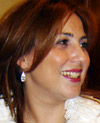 Edit Khachatouryan (“ILC international legal advisory” LLC, lawyer) has lived most of her life in the U.S.A. and thinks that democracy does not exist even in the U.S. since they have institutions that are keeping people occupied so they don’t have time to be involved in politics actively. “It is impossible to develop democracy in Armenia now. Being a small country Armenia easily can be managed by big countries. In that framework democracy is a little bit dangerous for Armenia. Please remember how the U.S.A. organized a revolution in Iran in 60s and spent maximum $5 million to change the whole political system of a country. Today they may easily influence on Armenia easily in the name of democracy, which is out of our national interests”, thinks Edit Khachatouryan. Notwithstanding, E. Khachatouryan thinks that it is possible to maneuver as well like Georgia is doing now. “I think that we should play a double game like Georgia is doing. They are speaking beautiful things, encouraging citizens and, for instance, when you are driving a car and there are no policemen, it makes people trust in the authorities”, says Edit Khachatouryan concerning some changes in the Georgian police structure and recommends the following, “We can do some small changes too. I don’t agree with the democracy that the U.S. and Europe want us to develop in Armenia”.
Edit Khachatouryan (“ILC international legal advisory” LLC, lawyer) has lived most of her life in the U.S.A. and thinks that democracy does not exist even in the U.S. since they have institutions that are keeping people occupied so they don’t have time to be involved in politics actively. “It is impossible to develop democracy in Armenia now. Being a small country Armenia easily can be managed by big countries. In that framework democracy is a little bit dangerous for Armenia. Please remember how the U.S.A. organized a revolution in Iran in 60s and spent maximum $5 million to change the whole political system of a country. Today they may easily influence on Armenia easily in the name of democracy, which is out of our national interests”, thinks Edit Khachatouryan. Notwithstanding, E. Khachatouryan thinks that it is possible to maneuver as well like Georgia is doing now. “I think that we should play a double game like Georgia is doing. They are speaking beautiful things, encouraging citizens and, for instance, when you are driving a car and there are no policemen, it makes people trust in the authorities”, says Edit Khachatouryan concerning some changes in the Georgian police structure and recommends the following, “We can do some small changes too. I don’t agree with the democracy that the U.S. and Europe want us to develop in Armenia”.
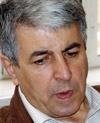 Garnik Asatryan, dean of the Yerevan State University department of Iranian sciences, says that it is better to speak about things taking into consideration the geopolitical location of Armenia. “Our society does not want democracy now, it wants freedom, fairness (with some national limitations), which can be achieved with the help of the law. It may be fair elections, which again returns to the issue of the political will of the authorities, anyhow, the authorities should make sure that the law is applied and followed in a duly manner”, thinks G. Asatryan.
Garnik Asatryan, dean of the Yerevan State University department of Iranian sciences, says that it is better to speak about things taking into consideration the geopolitical location of Armenia. “Our society does not want democracy now, it wants freedom, fairness (with some national limitations), which can be achieved with the help of the law. It may be fair elections, which again returns to the issue of the political will of the authorities, anyhow, the authorities should make sure that the law is applied and followed in a duly manner”, thinks G. Asatryan.
Mr. Asatryan thinks that applying the law is very important as well as from the point of the relationship with the national security institutions, “Let’s draw on the example of Israel. Even though there is war in Israel, their citizens cannot say that they are not free: the law is strictly applicable for everyone.”
Concerning the issue of separating democracy from rule of law the conductor of the discussion, Armen Baghdasaryan said that we should not forget that laws are adopted by people that can be elected in democratic conditions only. “If there is no electoral democracy, those who will be elected in the parliament may be too far from the law”, thinks A. Baghdasaryan. In other words, he thinks that for having good laws there should be democracy.
Even though most of the participants think that Armenia is not a democratic country, A. Margaryan says that during these 15 years the parliament has not adopted any anti-democratic laws.
It was also said that the vision of democracy and its contradiction with our national appearance is a result of the fact that we are importing democratic institutions from abroad, and in some cases it may be done under compulsion. Nevertheless, Mr. Jrbashyan thinks that we are not able to develop our own democratic methods without discussing the methods of others and it is better to import those institutions, “The world history has shown that the mentioned method is effective. We should import those institutions and figure our whether those are applicable in our environment or not”, assures the economist.
Mr. Jrbashyan thinks that we may use the method of electoral democracy, but even in that case the situation may change in Armenia and become worse again. He brought the example of Venezuela, Paraguay and Columbia, where the rule is elected through fair and democratic elections, however, during the recent years their economic growth mark was -2%. “Accordingly, democracy does not mean elections. Those are factors that are supporting democracy, but are not the only factor to have democracy”.
The dean of the department of economics of YSEI, Hovsep Aghajanyan called the problem as “an electoral phenomenon”. “I mean that elections lie in the basement of democracy, but elections have the relevant values in the basement. In this framework the Chinese, Japanese and the other relevant models are just the external view. Each country has its own model of development and its own system of distributing resources”, says H. Aghajanyan and asks whether we have thought about in which level of civilization development we are now. According to the economist, currently there is a war of civilizations and the economical competition bears only external character: “They say national, national… What is that “national”? What are the mechanisms of that? I don’t think that any laws may change anything if we know who we are, where we are going to and what we want”.
As for the necessity of democracy, Mr. Aghajanyan says that it doesn’t have an alternative. “Democracy and freedom should not be counterbalanced. Democracy and human rights should not be counterbalanced. Democracy and national security should not be counterbalanced. Democracy and rule of law should not be counterbalanced either, those are complex values”, thinks H. Aghajanyan.
During the discussion the participants discussed the issue of mentality and its influence on the ongoing processes. For instance, Mr. Angaladyan thinks that democracy has the national way of thinking in its basement. The director of “P-Art” company, Karen Kocharyan noted that the national mentality may change, thus the laws that we are rejecting now may be acceptable in ten years.
Garnik Asatryan thinks that there is no need to speak negatively about “the Armenian mentality”. “In the recent years people are speaking about the Armenian mentality as a way of thinking that is eastern, does not follow laws and was inherited from the Soviet Union. As a specialist of the eastern sciences, I’d like to note that our society has a high level of mentality, follows laws and as well as is clever”, said G. Asatryan and added that for instance in Iran those people who haven’t graduated from a university, are gay or have ever been a subject to criminal investigation cannot be elected in the parliament. “If we had such rules too, the parliament would be quite different not depending on the fact whether it would be democratic or not. In other words, we would create a democratic model basing on our national factors”.
The editor of the “168 Hours”, Satik Seiranyan totally agreed with G. Asatryan and noted that the law applies differently on different subjects. “There is no law that would allow anyone to pass crossroads in the red light or escape from paying taxes, however, the law is not applicable equally for everyone”, says S. Seiranyan. Concerning the mentioned issue Andranik Margaryan said that the reason is the fact that citizens don’t have “a character of an Armenian citizen”. “I don’t think it is the fault of citizens, I think it is the fault of the history since we haven’t had a formed state that would make people understand their responsibilities provided by their state. The new businessmen and the new generation are doing better than our generation. We are doing all what we have seen and how we were grown up. How could we change our character in one night or 15 years?” says Andranik Margaryan.
Concluding the discussion it is worth mentioning one proverb. Five blind wise men want to know what an elephant is. Once a mobile circus arrives in their city and brings an elephant. After the performance the five wise men are deciding to study the animal to see how it looks like. One of them pets the year of the elephant and says that it is something wide and senses like velvet and carpet. Another one climbs on the elephant and says that it is high and strong like a rock. Another one touches the trunk and says that it looks like a tube. The forth wise man hugs the leg of the elephant and assures everyone that it is a pillar. The fifth wise man, who is holding the tale of the elephant, says that the animal is something like a brush…
The participants of the discussion discussed the issue of this form of management in different aspects, anyhow, they didn’t come to a final conclusion on whether Armenia needs democracy or not. It was too hard to imagine the elephant: the issue of democracy was not given a final answer. Even it was spoken that the elephant did not exist at all and it was just vision. At the beginning of the discussion it seemed that the participants were sure that democracy was necessary. However, when they tried to discuss the factors of democracy (electoral democracy, rule of law, liberalization of economy, formation of civic institutions) and look it through the prism of the national factors, some of the participants said that democracy is dangerous for Armenia, nevertheless, neither of the participants could recommend an alternative to this form of management.
In the future the “Pressing” club will continue organizing discussions on different issues in participation with specialists, officials, politicians, journalists, lawyers and businessmen. You can learn about the ideas and conclusions spoken during the discussions in the “168 Hours” and speak your own point concerning the issues.
The next discussion will be dedicated to the results of currency exchange rate changes.

